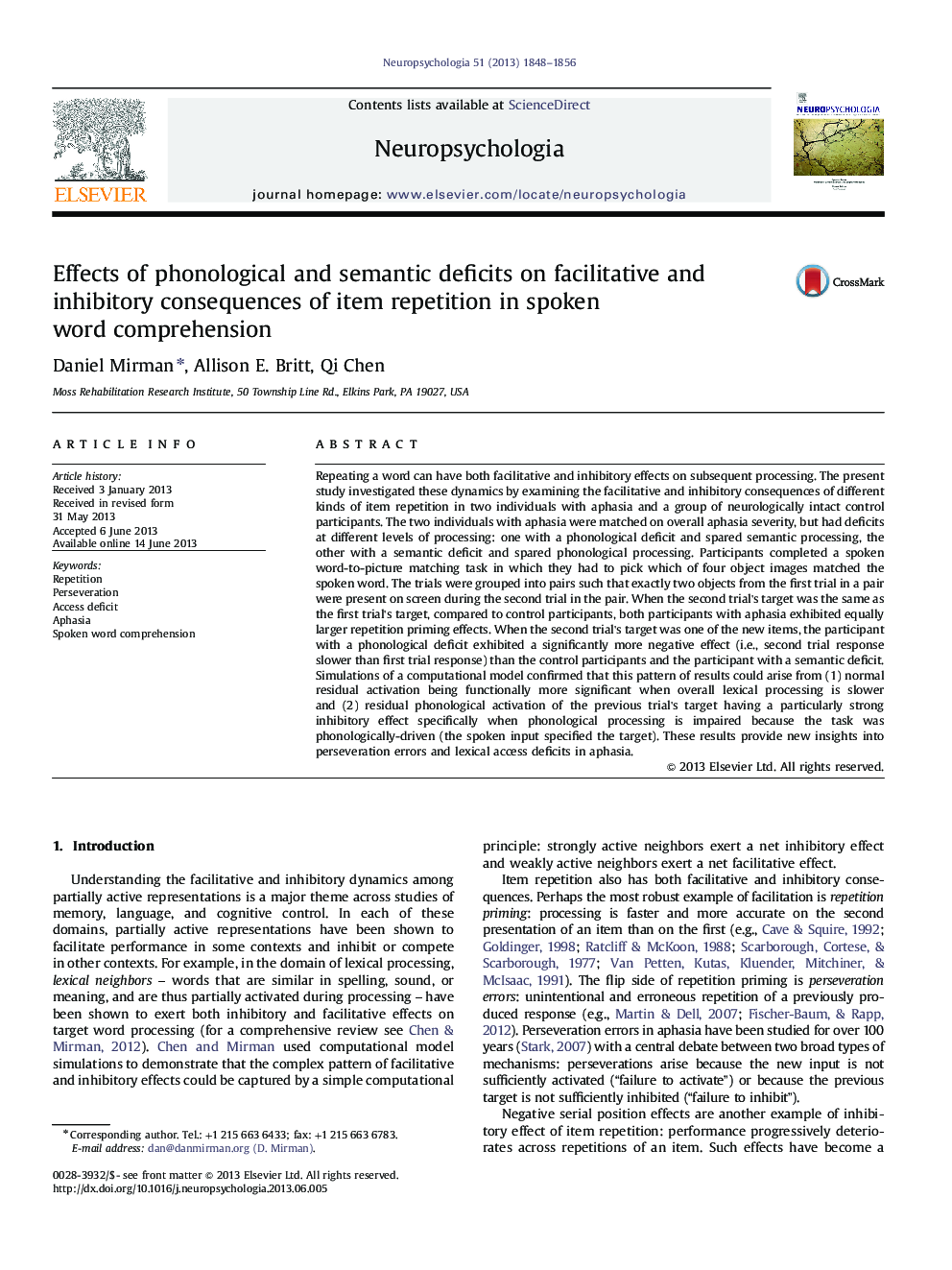| کد مقاله | کد نشریه | سال انتشار | مقاله انگلیسی | نسخه تمام متن |
|---|---|---|---|---|
| 10464778 | 925704 | 2013 | 9 صفحه PDF | دانلود رایگان |
عنوان انگلیسی مقاله ISI
Effects of phonological and semantic deficits on facilitative and inhibitory consequences of item repetition in spoken word comprehension
ترجمه فارسی عنوان
اثرات فقدان واژگانی و معناشناختی بر پیامدهای مهارتی و بازدارنده تکرار مورد در درک گفتار
دانلود مقاله + سفارش ترجمه
دانلود مقاله ISI انگلیسی
رایگان برای ایرانیان
کلمات کلیدی
تکرار، استقامت، کمبود دسترسی، افساسی، درک مطلب گفتاری،
ترجمه چکیده
تکرار یک کلمه می تواند تأثیرات مهیج و مهیبی را بر روی پردازش بعدی داشته باشد. در این مطالعه، این پویایی را با بررسی عواقب مهار کننده و مهار کننده انواع تکرار مورد در دو فرد مبتلا به آپنه و یک گروه از بیماران مبتلا به عفونت ناحیه تحت درمان بررسی کرد. دو فرد مبتلا به آفاشی با شدت آسم کامل مقایسه شدند، اما در سطوح مختلف پردازش اختلالاتی داشتند: یکی با کمبود واجشناسی و پردازش معناشناختی، دیگری با کمبود معنایی و پردازش واجشناسی. شرکت کنندگان یک کار مطابق با کلمه به تصویر را انجام دادند که در آن آنها مجبور بودند انتخاب کنند که کدام یک از چهار تصویر شیء با کلام گفتاری سازگار بود. آزمایشات به صورت جفتی دسته بندی شدند به طوری که دقیقا دو مورد از اولین آزمایش در یک جفت بر روی صفحه نمایش در طول آزمایش دوم در این جفت بود. هنگامی که هدف آزمایش دوم، همان هدف اول آزمایشی بود، در مقایسه با شرکت کنندگان کنترل، هر دو شرکت کننده با آپنه، اثرات پرایمر تکراری را به همان اندازه نمایش دادند. هنگامی که هدف آزمایش دوم، یکی از موارد جدید بود، شرکت کننده با کمبود واج شناختی اثرات منفی معناداری داشت (یعنی پاسخ دوم آزمایش کمتر از پاسخ دادرسی اول) نسبت به شرکت کنندگان کنترل و شرکت کننده با کمبود معنایی. شبیه سازی یک مدل محاسباتی تأیید کرد که این الگوی نتایج ممکن است از (1) فعال شدن باقی مانده نرمال، که عملا کارکردی مهم تر است، زمانی که پردازش کلی لغوی کندتر است و (2) فعال شدن واج شناختی واجد اهداف آزمایشی قبلی، به ویژه هنگامی که پردازش واج شناختی ناشی از آن است که وظیفه به وسیله فنولوژیکی هدایت شده است (ورودی سخن گفته هدف مشخص شده). این نتایج بینش جدیدی را در مورد اشتباهات پایداری و نقص دسترسی به واژگان در افسا ارائه می دهد.
موضوعات مرتبط
علوم زیستی و بیوفناوری
علم عصب شناسی
علوم اعصاب رفتاری
چکیده انگلیسی
Repeating a word can have both facilitative and inhibitory effects on subsequent processing. The present study investigated these dynamics by examining the facilitative and inhibitory consequences of different kinds of item repetition in two individuals with aphasia and a group of neurologically intact control participants. The two individuals with aphasia were matched on overall aphasia severity, but had deficits at different levels of processing: one with a phonological deficit and spared semantic processing, the other with a semantic deficit and spared phonological processing. Participants completed a spoken word-to-picture matching task in which they had to pick which of four object images matched the spoken word. The trials were grouped into pairs such that exactly two objects from the first trial in a pair were present on screen during the second trial in the pair. When the second trial's target was the same as the first trial's target, compared to control participants, both participants with aphasia exhibited equally larger repetition priming effects. When the second trial's target was one of the new items, the participant with a phonological deficit exhibited a significantly more negative effect (i.e., second trial response slower than first trial response) than the control participants and the participant with a semantic deficit. Simulations of a computational model confirmed that this pattern of results could arise from (1) normal residual activation being functionally more significant when overall lexical processing is slower and (2) residual phonological activation of the previous trial's target having a particularly strong inhibitory effect specifically when phonological processing is impaired because the task was phonologically-driven (the spoken input specified the target). These results provide new insights into perseveration errors and lexical access deficits in aphasia.
ناشر
Database: Elsevier - ScienceDirect (ساینس دایرکت)
Journal: Neuropsychologia - Volume 51, Issue 10, August 2013, Pages 1848-1856
Journal: Neuropsychologia - Volume 51, Issue 10, August 2013, Pages 1848-1856
نویسندگان
Daniel Mirman, Allison E. Britt, Qi Chen,
